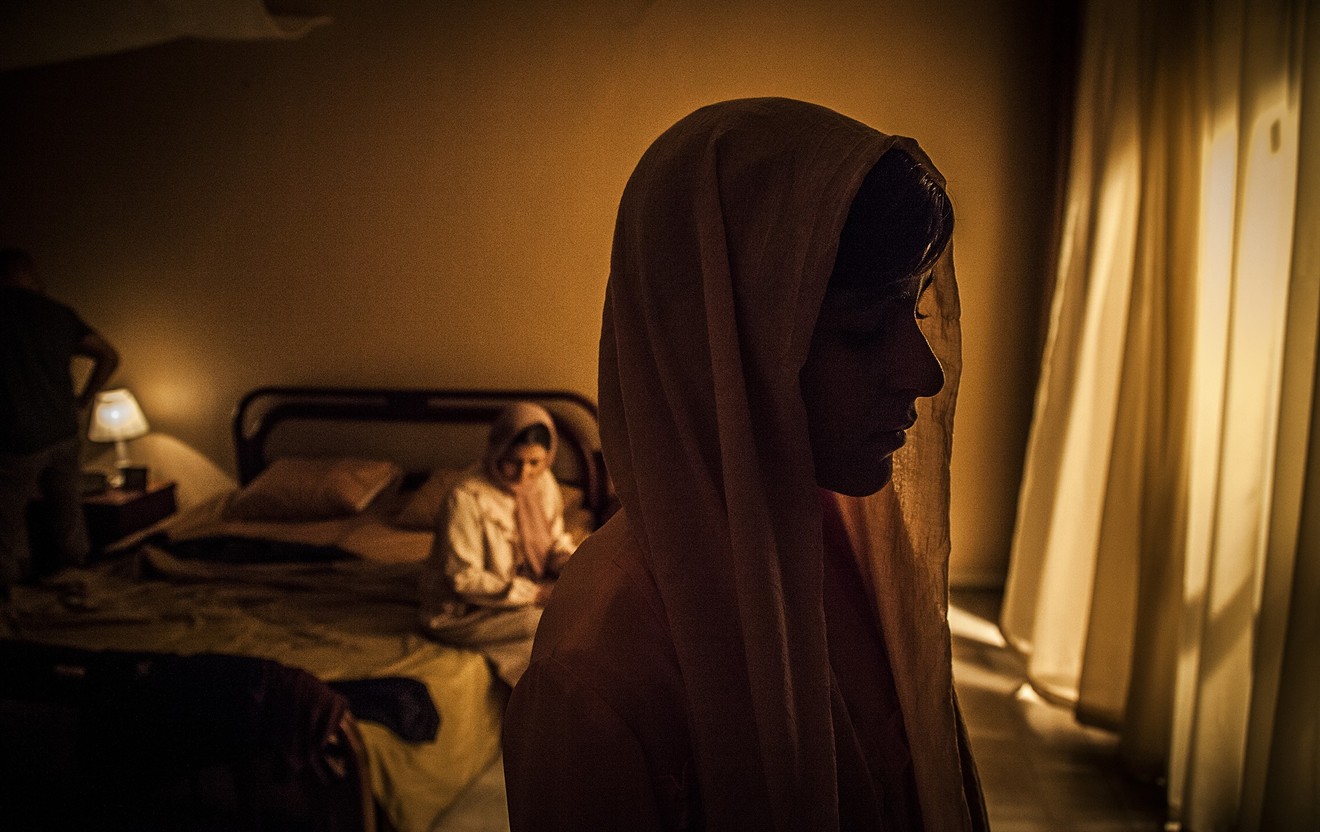Sixteen, socially curious and with aspirations to be a musician, the heroine of Ava — this imaginatively composed first feature by Sadaf Foroughi — rebuffs the expectations of her parents and the norms of the strict society around her. After getting dropped off one morning by her mother (Bahar Noohian) at her Tehran high school, Ava (Mahour Jabbari) cavorts with her friends Melody (Shayesteh Sajadi) and Shirin (Sarah Alimoradi). The three girls shuffle their backpacks on and off as they walk the grounds and dish about classmates, suitors, grades. Later, Ava convinces her father (Vahid Aghapoor) to drive her to Melody’s house for a purported study session; the girls instead dart for the bedroom mirror, where Melody applies mascara and lipstick to Ava’s face. Such acts of rebellion, however seemingly tiny, ignite the rage of the disciplinarians in Ava’s life — in particular her mother. She seeks to halt Ava’s violin lessons and even hauls her to an OB-GYN to find out if she’s been sexually active. Then there’s sternly mannered, white-gloved principal Ms. Dehkhoda (Leili Rashidi), who mixes sugar cubes into her tea when dishing out admonishments. Following what she views as multiple behavioral infractions, Dehkhoda embarks on a vendetta to get Ava expelled.
Flashes of Ava’s upbeat, unbridled personality come few and far between: the pluck she exhibits in the schoolyard conversation with her friends, the smile she lets loose upon seeing her made-up face looking back at her. Foroughi’s movie surveys how the mounting external pressures in Ava’s life bring her to a near–breaking point, and the director has devised (with cinematographer Sina Kermanizadeh) an explosive visual grammar to approximate the depths of Ava’s isolation and pain.
Early on, in an initially mundane marital dialogue at the breakfast table, husband and wife frankly discuss their jobs, their finances and Ava’s schooling. Foroughi makes clear, in a shot of Ava packing her things in an adjoining room, that the sound of the parents’ ruminations bleeds cleanly through the walls. The topic turns to Ava, and mom’s searingly personal insights — “I don’t know how to communicate with my own child” — resound over a close-up of Ava obediently tying her shoes. These broken avenues of communication, with adults barking about adolescents in a closed loop without making time for the youngsters’ perspectives or feelings, is a recurring concern of the movie, not least in the form of Ms. Dehkhoda, who thinks it prudent to cut into class time to warn about the menace of overeaters (“They get up at night, while everyone is sleeping, and sneak over to the fridge.”).
Even when alone, Ava can’t escape. Foroughi shoots one of her solo practice sessions nearly entirely, and wrenchingly, in soft focus — as if the very idea of her pursuing such a calling were a pipe dream, a paradise lost. Foroughi also (with the help of diligent sound work by Amirhossein Ghasemi) exhibits a resonant command of offscreen space. Some two-person conversations progress with one participant standing fully out of frame — another vivid evocation of the disconnect that can occur in heated shouting matches, with people talking at each other rather than meeting halfway. Foroughi at times sidesteps such cerebral strategies and aims for outright suspense, as with one bracing long take in which Ava attempts to sneak in a sensitive call phone while her mom is in the bathroom. The deft interplay between Ava’s panicked spinning of the phone dial and the softly running water in the other room speaks to the turmoil that even a simple check-in with a friend has for this teenager. At its most gripping, Ava communicates such familiar adolescent agonies through formal detail that makes them smolder anew.
[
{
"name": "Air - MediumRectangle - Inline Content - Mobile Display Size",
"component": "19274298",
"insertPoint": "2",
"requiredCountToDisplay": "2"
},{
"name": "Editor Picks",
"component": "17482312",
"insertPoint": "4",
"requiredCountToDisplay": "1"
},{
"name": "Inline Links",
"component": "18711090",
"insertPoint": "8th",
"startingPoint": 8,
"requiredCountToDisplay": "7",
"maxInsertions": 25
},{
"name": "Air - MediumRectangle - Combo - Inline Content",
"component": "17482310",
"insertPoint": "8th",
"startingPoint": 8,
"requiredCountToDisplay": "7",
"maxInsertions": 25
},{
"name": "Inline Links",
"component": "18711090",
"insertPoint": "8th",
"startingPoint": 12,
"requiredCountToDisplay": "11",
"maxInsertions": 25
},{
"name": "Air - Leaderboard Tower - Combo - Inline Content",
"component": "17482313",
"insertPoint": "8th",
"startingPoint": 12,
"requiredCountToDisplay": "11",
"maxInsertions": 25
}
]











